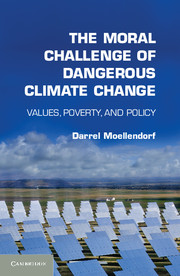Book contents
- Frontmatter
- Dedication
- Contents
- Acknowledgments
- Introduction
- 1 Danger, Poverty, and Human Dignity
- 2 The Value of Biodiversity
- 3 Risks, Uncertainties, and Precaution
- 4 Discounting the Future and the Morality in Climate Change Economics
- 5 The Right to Sustainable Development
- 6 Responsibility and Climate Change Policy
- 7 Urgency and Policy
- Afterword Frankenstorms
- Appendix A The Antipoverty Principle and the Non-Identity Problem
- Appendix B Climate Change and the Human Rights of Future Persons: Assessing Four Philosophical Challenges
- Appendix C The Right to Sustainable Development versus International Paretianism
- Appendix D Declaration on Climate Justice
- Bibliography
- Index
- References
Appendix C - The Right to Sustainable Development versus International Paretianism
Published online by Cambridge University Press: 05 June 2014
- Frontmatter
- Dedication
- Contents
- Acknowledgments
- Introduction
- 1 Danger, Poverty, and Human Dignity
- 2 The Value of Biodiversity
- 3 Risks, Uncertainties, and Precaution
- 4 Discounting the Future and the Morality in Climate Change Economics
- 5 The Right to Sustainable Development
- 6 Responsibility and Climate Change Policy
- 7 Urgency and Policy
- Afterword Frankenstorms
- Appendix A The Antipoverty Principle and the Non-Identity Problem
- Appendix B Climate Change and the Human Rights of Future Persons: Assessing Four Philosophical Challenges
- Appendix C The Right to Sustainable Development versus International Paretianism
- Appendix D Declaration on Climate Justice
- Bibliography
- Index
- References
Summary
Eric A. Posner and David Weisbach's central argument against the right to sustainable development is perhaps charitably made fully explicit as follows: (1) States act (almost) only on their perceived interests. Therefore, (2) a policy is feasible only if it is in the perceived interests of all of the states making the policy. (3) Policy pursuing the right to sustainable development necessarily involves international redistribution. (4) International redistribution is not in the perceived interests of states out of which resources would flow. Therefore, (5) a policy pursuing the right to sustainable development is infeasible. However, because this does not establish that international Paretianism is feasible, more must be said to avoid the tragic situation in which there are no feasible policies. Thus, the argument continues. (6) International Paretianism is in the perceived interests of all states making policy. Therefore, (7) international Paretianism is feasible. In this appendix I shall discuss three problems that render this argument unsound.
The most significant problem with the argument is logical. It does not rule out the possibility of the tragic situation; this is because the inference to (7) is invalid. To see this, focus your attention on premises (2) and (6). Premise (2) states what must be the case if a policy is to be feasible. In other words, it states a necessary condition of feasibility. Premise (6) states that international Paretianism meets the necessary condition. It does not follow that international Paretianism is feasible.
- Type
- Chapter
- Information
- The Moral Challenge of Dangerous Climate ChangeValues, Poverty, and Policy, pp. 236 - 239Publisher: Cambridge University PressPrint publication year: 2014

